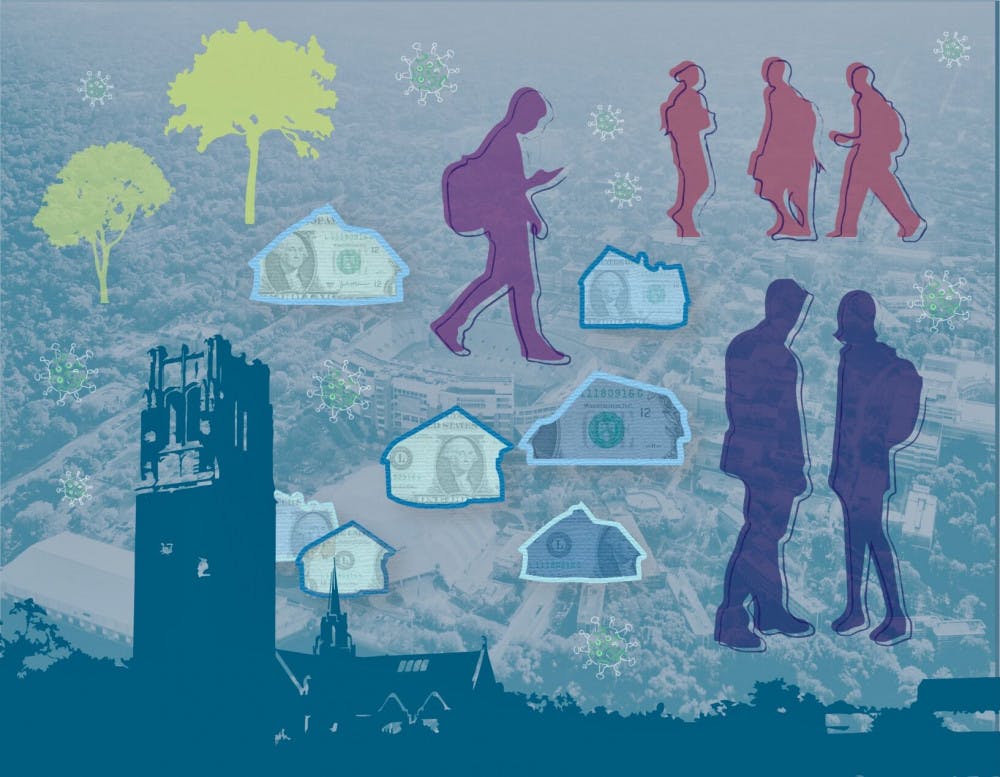
Tourism is at the heart of Gainesville’s economy, but little recreation exists during the pandemic.
Each year, tourism brings in about $763.3 million to Alachua County through direct spending, said Jessica Hurov, the tourism development manager for Visit Gainesville, Alachua County. But without popular visitor draws like UF Parents Weekend, graduation ceremonies and sold-out football games due to COVID-19 safety precautions and restrictions, the industry is suffering.
“This has been a remarkably difficult time, not only for the hospitality or tourism industry, but for day to day lives,” Hurov said. “It's been an ongoing adjustment to what everyone calls the new normal.”
Visit Gainesville, Alachua County, a group that helps bring tourists to the area, is funded by part of the Tourist Development tax, a 5% tax paid by visitors to hotels or other temporary accommodations, Hurov said.
In 2019, the tax resulted in a record-setting $5.528 million dollars in Alachua County, she said.
Tax collection is down 17.5%, or about $884 thousand, between October 2019 and July 2020 compared to the same period last year, Hurov wrote in an email.
Money raised through the tax also goes into projects like building recreation centers and sports complexes and supporting non-profit organizations through the Nature and Culture Destination Enhancement Grants and Local Sports Destination Enhancement Grant, she said.
“Travel and tourism is essential for the health of the Alachua County economy,” Hurov said.
The hospitality industry is responsible for providing 7.3% of employment in Alachua County, Hurov said. This accounts for about 12,000 jobs.
In 2019, more than 2 million visitors visited and stayed in an inn or hotel in Gainesville, generating a revenue of $110 million dollars between 58 hotels, motels and inns, Hurov said.
But Cindy Montalto, the owner of Magnolia Plantation Bed and Breakfast Inn at 309 SE Seventh St., said business has been tough since the onslaught of the pandemic.
Montalto and her husband Joe were married in Gainesville in 1977 while he was a UF student. Shortly after, they moved to Houston. After 13 years away from Gainesville they moved back with the intention of opening the city’s first bed and breakfast.
One year later, in 1991, they opened Magnolia Plantation on UF graduation weekend and have been open ever since.
The biggest reason people stay at the inn is football games and parents weekend, Montalto said. Without those canceled or at limited capacity, the bookings are down 30% from this time last year.
She said the inn has remained open through the year. Each cottage has its own entrance and they have been operating through contactless check-in.
Patrons are very loyal to the inn, she said.
“We’ll have people say ‘We were going to go up to the mountains but we decided to come to Gainesville instead because we know you and we know you need the money, so we'll vacation here,’” Montalto said.
Still, she worries about the future of Magnolia Plantation.
“Joe is the glass-half-full and I’m the glass-half-empty,” she said.
She was so worried she forced herself to focus on other tasks over the summer. She said she spent time alphabetizing her spices and starting a vegetable garden.
But ultimately she knows Magnolia Plantation isn’t going anywhere.
“I've got enough faith to know that the City of Gainesville does not want to see the bed and breakfast district go away,” she said. “We’ve been here for 30 years, so there’s been times when it has been hard. It will be OK.”
Besides university events, a big reason for tourism to Gainesville is the surrounding nature, said Tatiana Borasova, an associate professor and extension specialist of water economics and policy at UF Institute of Food and Agricultural Sciences.
“Springs attract many visitors -- locals and those from outside the region, and these visitors bring money to local businesses, including stores and places that are selling food and beverages, gas stations, places with diving gear rentals and diving training, and lodging,” she said.
A study she conducted in 2014 estimated non-local visitors to springs in the region spent $45.33 million dollars.
Although springs attract many people tired of sitting at home, Borasova said she doesn't expect visitation to be back to pre-pandemic levels anytime soon.
No specific data about state park visitation from the Florida Department of Environmental Protection is currently available, she said, so it’s hard to say exactly how much of an impact the pandemic has had on visitation.
A Google COVID-19 Community Mobility Report shows “mobility trends for places like national parks, public beaches, marinas, dog parks, plazas, and public gardens,” in Alachua County is currently 32% below normal. Statewide, the mobility for parks is down 23%.
Borasova said she hopes she is proven overtime the impact is less severe than the study shows.
“Beyond the economic impact, the most important priority is people's health,” she said.
Correction: This article has been updated to reflect that tourism brings in about $763.3 million to Alachua County and tax collection is down $884 thousand compared to the same period last year; the full name Visit Gainesville, Alachua County has been included; and clarification on where part of the Tourist Development tax is contributed to has been added. The Alligator previously reported otherwise.

Nora O'Neill is a fourth-year journalism and philosophy student and the Enterprise Editor for The Alligator. She previously served as the Avenue Editor and the business and economics beat reporter. In her free time you can find her reading books with no plot and abusing her Chemex.





